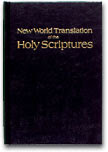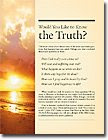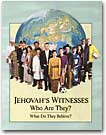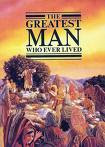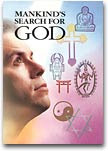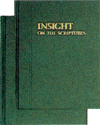Jehovah himself has become king! Let the earth be joyful. Let the many islands rejoice.
Clouds and thick gloom are all around him; Righteousness and judgment are the established place of his throne.
Before him a very fire goes, And it consumes his adversaries all around.
His lightnings lighted up the productive land; The earth saw and came to be in severe pains.
The mountains themselves proceeded to melt just like wax on account of Jehovah, On account of the Lord of the whole earth.
The heavens have told forth his righteousness, And all the peoples have seen his glory.
(Psalm 97:1-6)
Praise Jah, you people! Praise God in his holy place. Praise him in the expanse of his strength.
Praise him for his works of mightiness. Praise him according to the abundance of his greatness.
Praise him with the blowing of the horn. Praise him with the stringed instrument and the harp.
Praise him with the tambourine and the circle dance. Praise him with strings and the pipe.
Praise him with the cymbals of melodious sound. Praise him with the clashing cymbals.
Every breathing thing—let it praise Jah. Praise Jah, you people!
(Psalm 150:1-6)
Say to those who are anxious at heart: "Be strong. Do not be afraid. Look! Your own God will come with vengeance itself, God even with a repayment. He himself will come and save you people."
At that time the eyes of the blind ones will be opened, and the very ears of the deaf ones will be unstopped.
At that time the lame one will climb up just as a stag does, and the tongue of the speechless one will cry out in gladness. For in the wilderness waters will have burst out, and torrents in the desert plain.
And the heat-parched ground will have become as a reedy pool, and the thirsty ground as springs of water. In the abiding place of jackals, a resting-place for them, there will be green grass with reeds and papyrus plants.
And there will certainly come to be a highway there, even a way; and the Way of Holiness it will be called. The unclean one will not pass over it. And it will be for the one walking on the way, and no foolish ones will wander about on it.
No lion will prove to be there, and the rapacious sort of wild beasts will not come up on it. None will be found there; and the repurchased ones must walk there.
And the very ones redeemed by Jehovah will return and certainly come to Zion with a joyful cry; and rejoicing to time indefinite will be upon their head. To exultation and rejoicing they will attain, and grief and sighing must flee away.
(Isaiah 35:4-10)
Jehovah is a God exacting exclusive devotion and taking vengeance; Jehovah is taking vengeance and is disposed to rage. Jehovah is taking vengeance against his adversaries, and he is resentful toward his enemies.
Jehovah is slow to anger and great in power, and by no means will Jehovah hold back from punishing. In destructive wind and in storm is his way, and the cloud mass is the powder of his feet.
He is rebuking the sea, and he dries it up; and all the rivers he actually makes run dry. Bashan and Carmel have withered, and the very blossom of Leb′a‧non has withered.
Mountains themselves have rocked because of him, and the very hills found themselves melting. And the earth will be upheaved because of his face; the productive land also, and all those dwelling in it.
In the face of his denunciation who can stand? And who can rise up against the heat of his anger? His own rage will certainly be poured out like fire, and the very rocks will actually be pulled down because of him.
Jehovah is good, a stronghold in the day of distress. And he is cognizant of those seeking refuge in him.
And by the flood that is passing along he will make an outright extermination of her place, and darkness will pursue his very enemies.
(Nahum 1:2-8)
Tuesday, May 26, 2009
Saturday, May 23, 2009
Be Silent--Wait for Jehovah
Be silent.
Can you hear our great God Jehovah? He calls for you. That is why we are told, "Indeed toward God wait silently, O my soul." Why? "Because from him is my hope. Indeed he is my rock and my salvation, my secure height; I shall not be made to totter. Upon God are my salvation and my glory. My strong rock, my refuge is in God."-Psalm 62:5-7
One part of our worship is sitting silently and listening to Jehovah speak through nature and His Word, the Bible. "Good it is that one should wait, even silently, for the salvation of Jehovah." (Lamentations 3:26) The Word itself says, "All Scripture is inspired of God and beneficial for teaching, for reproving, for setting things straight, for disciplining in righteousness, that the man of God may be fully competent, completely equipped for every good work." (2 Timothy 3:16-17) "The heavens are declaring the glory of God."-Psalm 19:1
The hustle and bustle of life today drown out the voice of Jehovah, who is trying to draw us to Him. (John 6:44) People today cannot hear it. Even some of Jehovah's own worshipers cannot hear His voice. Many of Jehovah's Christian Witnesses look at the Bible and try to intellectually learn about Jehovah. These same people never try to "draw close to God" and really get to know Him.-James 4:8
In his letter to the Romans, Paul said, "Everyone who calls on the name of Jehovah will be saved. However, how will they call on him in whom they have not put faith?" (Romans 10:13-14) We can go further and ask how we can put faith in God if we do not get to know Him. It is very important that we get to know Jehovah God.
"The name of Jehovah is a strong tower. Into it the righteous runs and is given protection." (Proverbs 18:10) When we get to know Jehovah God, truly get to know Him on a personal level, we are assured of His divine support and protection. What can be more important then that. We never want to be like the Israelites in Jesus day who "honors [God] with their lips, yet their heart is far removed from [Him]." (Matthew 15:8) These people never really "taste and see that Jehovah is good" nor do they know "the power of God."-Psalm 34:8; Matthew 22:29
When we get to know Jehovah we are more likely to "subject [our]selves to God." (James 4:7) So, it is imperative that we get to know Jehovah, one of which is silently waiting on Him and pondering and meditating on His Word. Do more then try to learn about Jehovah, not forgetting that this is important, but get to know Jehovah. That is far more rewarding.-Isaiah 41:13; John 17:3
Can you hear our great God Jehovah? He calls for you. That is why we are told, "Indeed toward God wait silently, O my soul." Why? "Because from him is my hope. Indeed he is my rock and my salvation, my secure height; I shall not be made to totter. Upon God are my salvation and my glory. My strong rock, my refuge is in God."-Psalm 62:5-7
One part of our worship is sitting silently and listening to Jehovah speak through nature and His Word, the Bible. "Good it is that one should wait, even silently, for the salvation of Jehovah." (Lamentations 3:26) The Word itself says, "All Scripture is inspired of God and beneficial for teaching, for reproving, for setting things straight, for disciplining in righteousness, that the man of God may be fully competent, completely equipped for every good work." (2 Timothy 3:16-17) "The heavens are declaring the glory of God."-Psalm 19:1
The hustle and bustle of life today drown out the voice of Jehovah, who is trying to draw us to Him. (John 6:44) People today cannot hear it. Even some of Jehovah's own worshipers cannot hear His voice. Many of Jehovah's Christian Witnesses look at the Bible and try to intellectually learn about Jehovah. These same people never try to "draw close to God" and really get to know Him.-James 4:8
In his letter to the Romans, Paul said, "Everyone who calls on the name of Jehovah will be saved. However, how will they call on him in whom they have not put faith?" (Romans 10:13-14) We can go further and ask how we can put faith in God if we do not get to know Him. It is very important that we get to know Jehovah God.
"The name of Jehovah is a strong tower. Into it the righteous runs and is given protection." (Proverbs 18:10) When we get to know Jehovah God, truly get to know Him on a personal level, we are assured of His divine support and protection. What can be more important then that. We never want to be like the Israelites in Jesus day who "honors [God] with their lips, yet their heart is far removed from [Him]." (Matthew 15:8) These people never really "taste and see that Jehovah is good" nor do they know "the power of God."-Psalm 34:8; Matthew 22:29
When we get to know Jehovah we are more likely to "subject [our]selves to God." (James 4:7) So, it is imperative that we get to know Jehovah, one of which is silently waiting on Him and pondering and meditating on His Word. Do more then try to learn about Jehovah, not forgetting that this is important, but get to know Jehovah. That is far more rewarding.-Isaiah 41:13; John 17:3
Thursday, April 30, 2009
Jehovah
Judges 5:3-5
"Listen, you kings; give ear, you high officials: I to Jehovah, yes, I, will sing. I shall make melody to Jehovah, Israel’s God. Jehovah, at your going forth from Seir, at your marching out of the field of Edom, Earth rocked, heavens also dripped, clouds also dripped with water. Mountains flowed away from the face of Jehovah, this Sinai away from the face of Jehovah, Israel’s God."
Job 37:3-6
"Under the whole heavens he lets it loose, and his lightning is to the extremities of the earth. After it a sound roars; He thunders with the sound of his superiority, and he does not hold them back when his voice is heard. God thunders with his voice in a wonderful way, doing great things that we cannot know. For to the snow he says, 'Fall earthward,' and to the downpour of rain, even to the downpour of his strong rains."
Psalm 24:7-10, Recovery Version
"Lift up your heads, O gates; and be lifted up, O long enduring doors; and the King of Glory will come in. Who is the King of Glory? Jehovah strong and mighty! Jehovah mighty in battle! Lift up your heads, O gates; and lift up, O long enduring doors; and the King of Glory will come in. Who is this King of Glory? Jehovah of [Armies]--He is the King of Glory!"
Psalm 36:5-7
"O Jehovah, your loving-kindness is in the heavens; Your faithfulness is up to the clouds. Your righteousness is like mountains of God; Your judicial decision is a vast watery deep. Man and beast you save, O Jehovah. How precious your loving-kindness is, O God! And in the shadow of your wings the sons of men themselves take refuge."
Psalm 44:4-8
"You yourself are my King, O God. Command grand salvation for Jacob. By you we shall push our adversaries themselves; in your name we shall tread down those rising up against us. For it was not in my bow that I kept trusting and it was not my sword that was saving me. For you saved us from our adversaries, and those intensely hating us you put to shame. In God we will offer praise all day long, and to time indefinite your name we shall laud."
Psalm 97:1-6
"Jehovah himself has become king! Let the earth be joyful. Let the many islands rejoice. Clouds and thick gloom are all around him; righteousness and judgment are the established place of his throne. Before him a very fire goes, and it consumes his adversaries all around. His lightnings lighted up the productive land; the earth saw and came to be in severe pains. The mountains themselves proceeded to melt just like wax on account of Jehovah, on account of the Lord of the whole earth. The heavens have told forth his righteousness, and all the peoples have seen his glory."
Psalm 136:1-7, 23-26
"Give thanks to Jehovah, O you people, for he is good...
Give thanks to the God of the gods...
Give thanks to the Lord of the lords...
To the Doer of wonderful, great things by himself...
To the One making the heavens with understanding...
To the One laying out the earth above the waters...
To the One making the great lights...
Who during our low condition remembered us...
And who repeatedly tore us away from our adversaries...
The One giving food to all flesh...
Give thanks to the God of the heavens...
For his loving-kindness is to time indefinite."
Psalm 145:1-6
"I will exalt you, O my God the King, and I will bless your name to time indefinite, even forever. All day long I will bless you, and I will praise your name to time indefinite, even forever. Jehovah is great and very much to be praised, and his greatness is unsearchable. Generation after generation will commend your works, and about your mighty acts they will tell. The glorious splendor of your dignity and the matters of your wonderful works I will make my concern. And they will talk about the strength of your own fear-inspiring things; and as for your greatness, I will declare it."
Psalms 147:1-7
"Praise Jah, you people, for it is good to make melody to our God; for it is pleasant—praise is fitting. Jehovah is building Jerusalem; the dispersed ones of Israel he brings together. He is healing the brokenhearted ones, and is binding up their painful spots. He is counting the number of the stars; all of them he calls by their names. Our Lord is great and is abundant in power; His understanding is beyond recounting. Jehovah is relieving the meek ones; He is abasing the wicked ones to the earth. Respond to Jehovah with thanksgiving, you people; make melody to our God on the harp."
Nahum 1:2-7
"Jehovah is a God exacting exclusive devotion and taking vengeance; Jehovah is taking vengeance and is disposed to rage. Jehovah is taking vengeance against his adversaries, and he is resentful toward his enemies. Jehovah is slow to anger and great in power, and by no means will Jehovah hold back from punishing. In destructive wind and in storm is his way, and the cloud mass is the powder of his feet. He is rebuking the sea, and he dries it up; and all the rivers he actually makes run dry. Bashan and Carmel have withered, and the very blossom of Lebanon has withered. Mountains themselves have rocked because of him, and the very hills found themselves melting. And the earth will be upheaved because of his face; the productive land also, and all those dwelling in it. In the face of his denunciation who can stand? And who can rise up against the heat of his anger? His own rage will certainly be poured out like fire, and the very rocks will actually be pulled down because of him. Jehovah is good, a stronghold in the day of distress. And he is cognizant of those seeking refuge in him."
Revelation 4:8-11
"And as for the four living creatures, each one of them respectively has six wings; round about and underneath they are full of eyes. And they have no rest day and night as they say: 'Holy, holy, holy is Jehovah God, the Almighty, who was and who is and who is coming.' And whenever the living creatures offer glory and honor and thanksgiving to the one seated upon the throne, the one that lives forever and ever, the twenty-four elders fall down before the One seated upon the throne and worship the One that lives forever and ever, and they cast their crowns before the throne, saying: 'You are worthy, Jehovah, even our God, to receive the glory and the honor and the power, because you created all things, and because of your will they existed and were created.'
Revelation 15:3-4
"Great and wonderful are your works, Jehovah God, the Almighty. Righteous and true are your ways, King of eternity. Who will not really fear you, Jehovah, and glorify your name, because you alone are loyal? For all the nations will come and worship before you, because your righteous decrees have been made manifest."
"Listen, you kings; give ear, you high officials: I to Jehovah, yes, I, will sing. I shall make melody to Jehovah, Israel’s God. Jehovah, at your going forth from Seir, at your marching out of the field of Edom, Earth rocked, heavens also dripped, clouds also dripped with water. Mountains flowed away from the face of Jehovah, this Sinai away from the face of Jehovah, Israel’s God."
Job 37:3-6
"Under the whole heavens he lets it loose, and his lightning is to the extremities of the earth. After it a sound roars; He thunders with the sound of his superiority, and he does not hold them back when his voice is heard. God thunders with his voice in a wonderful way, doing great things that we cannot know. For to the snow he says, 'Fall earthward,' and to the downpour of rain, even to the downpour of his strong rains."
Psalm 24:7-10, Recovery Version
"Lift up your heads, O gates; and be lifted up, O long enduring doors; and the King of Glory will come in. Who is the King of Glory? Jehovah strong and mighty! Jehovah mighty in battle! Lift up your heads, O gates; and lift up, O long enduring doors; and the King of Glory will come in. Who is this King of Glory? Jehovah of [Armies]--He is the King of Glory!"
Psalm 36:5-7
"O Jehovah, your loving-kindness is in the heavens; Your faithfulness is up to the clouds. Your righteousness is like mountains of God; Your judicial decision is a vast watery deep. Man and beast you save, O Jehovah. How precious your loving-kindness is, O God! And in the shadow of your wings the sons of men themselves take refuge."
Psalm 44:4-8
"You yourself are my King, O God. Command grand salvation for Jacob. By you we shall push our adversaries themselves; in your name we shall tread down those rising up against us. For it was not in my bow that I kept trusting and it was not my sword that was saving me. For you saved us from our adversaries, and those intensely hating us you put to shame. In God we will offer praise all day long, and to time indefinite your name we shall laud."
Psalm 97:1-6
"Jehovah himself has become king! Let the earth be joyful. Let the many islands rejoice. Clouds and thick gloom are all around him; righteousness and judgment are the established place of his throne. Before him a very fire goes, and it consumes his adversaries all around. His lightnings lighted up the productive land; the earth saw and came to be in severe pains. The mountains themselves proceeded to melt just like wax on account of Jehovah, on account of the Lord of the whole earth. The heavens have told forth his righteousness, and all the peoples have seen his glory."
Psalm 136:1-7, 23-26
"Give thanks to Jehovah, O you people, for he is good...
Give thanks to the God of the gods...
Give thanks to the Lord of the lords...
To the Doer of wonderful, great things by himself...
To the One making the heavens with understanding...
To the One laying out the earth above the waters...
To the One making the great lights...
Who during our low condition remembered us...
And who repeatedly tore us away from our adversaries...
The One giving food to all flesh...
Give thanks to the God of the heavens...
For his loving-kindness is to time indefinite."
Psalm 145:1-6
"I will exalt you, O my God the King, and I will bless your name to time indefinite, even forever. All day long I will bless you, and I will praise your name to time indefinite, even forever. Jehovah is great and very much to be praised, and his greatness is unsearchable. Generation after generation will commend your works, and about your mighty acts they will tell. The glorious splendor of your dignity and the matters of your wonderful works I will make my concern. And they will talk about the strength of your own fear-inspiring things; and as for your greatness, I will declare it."
Psalms 147:1-7
"Praise Jah, you people, for it is good to make melody to our God; for it is pleasant—praise is fitting. Jehovah is building Jerusalem; the dispersed ones of Israel he brings together. He is healing the brokenhearted ones, and is binding up their painful spots. He is counting the number of the stars; all of them he calls by their names. Our Lord is great and is abundant in power; His understanding is beyond recounting. Jehovah is relieving the meek ones; He is abasing the wicked ones to the earth. Respond to Jehovah with thanksgiving, you people; make melody to our God on the harp."
Nahum 1:2-7
"Jehovah is a God exacting exclusive devotion and taking vengeance; Jehovah is taking vengeance and is disposed to rage. Jehovah is taking vengeance against his adversaries, and he is resentful toward his enemies. Jehovah is slow to anger and great in power, and by no means will Jehovah hold back from punishing. In destructive wind and in storm is his way, and the cloud mass is the powder of his feet. He is rebuking the sea, and he dries it up; and all the rivers he actually makes run dry. Bashan and Carmel have withered, and the very blossom of Lebanon has withered. Mountains themselves have rocked because of him, and the very hills found themselves melting. And the earth will be upheaved because of his face; the productive land also, and all those dwelling in it. In the face of his denunciation who can stand? And who can rise up against the heat of his anger? His own rage will certainly be poured out like fire, and the very rocks will actually be pulled down because of him. Jehovah is good, a stronghold in the day of distress. And he is cognizant of those seeking refuge in him."
Revelation 4:8-11
"And as for the four living creatures, each one of them respectively has six wings; round about and underneath they are full of eyes. And they have no rest day and night as they say: 'Holy, holy, holy is Jehovah God, the Almighty, who was and who is and who is coming.' And whenever the living creatures offer glory and honor and thanksgiving to the one seated upon the throne, the one that lives forever and ever, the twenty-four elders fall down before the One seated upon the throne and worship the One that lives forever and ever, and they cast their crowns before the throne, saying: 'You are worthy, Jehovah, even our God, to receive the glory and the honor and the power, because you created all things, and because of your will they existed and were created.'
Revelation 15:3-4
"Great and wonderful are your works, Jehovah God, the Almighty. Righteous and true are your ways, King of eternity. Who will not really fear you, Jehovah, and glorify your name, because you alone are loyal? For all the nations will come and worship before you, because your righteous decrees have been made manifest."
Wednesday, April 29, 2009
What About...Luke 23:43?
*"Jesus answered him, 'Truly I tell you, today you will be with me in paradise.'"-Luke 23:43, Today's New International Version*
The New World Translations renders this verse: "And he said to him: 'Truly I tell you today, You will be with me in Paradise.'"
Many people criticize this rendering based off of the comma placement. If most Bible's like the TNIV are correct then the thief (and Jesus) went to "paradise" that same day. If the NWT is correct then the thief was in "paradise" later. Where the comma is placed changes the entire meaning of the sentence.
The first thing that any person who wants to determine where the comma goes has to keep one thing in mind--Koine Greek did not have a comma. Yes, every single comma in your New Testament was added by the translators. When it comes to Luke 23:43, bias dictates where someone puts the comma.
The basic belief of most so-called Christians today is that when someone dies they immediately go to heaven. The thief, having repented of his sins, would have gone to heaven that same day. Their doctrine requires that.
Is it true that Jesus went to heaven that same day? Did the thief go to heaven that same day? Which rendering agrees with the basic teachings of the Bible?
First of all, what does the Bible say? The King James Version says at Acts 2:31, "He seeing this before spake of the resurrection of Christ, that his soul was not left in hell, neither his flesh did see corruption. Other Bible translations say that he was not left in "hades." (New American Standard Bible, English Standard Version) Obviously, when Jesus died, he was in hell, or hades, not heaven. The Bible says that he was in "hell" for three days.-Luke 24:7; Acts 10:40
Second, Jesus said that only those who were "born again" could "see the Kingdom of God." (John 3:3) Being born again involved being "born from water and spirit." (John 3:5) So, these people had to be baptized in water, and then be baptized in the holy spirit. When did the baptism with holy spirit take place?-Mark 1:8
Jesus Christ died on the Passover. 50 days later, on Pentecost, the Bible reports that the disciples "were all together at the same place, and suddenly there occurred from heaven a noise just like that of a rushing stiff breeze, and it filled the whole house in which they were sitting. And tongues as if of fire became visible to them and were distributed about, and one sat upon each one of them, and they all became filled with holy spirit and started to speak with different tongues, just as the spirit was granting them to make utterance. (Acts 2:1-4) So, it wasn't until 50 days after Jesus died that the first ones were "born again", or "born from water and spirit." The repentant thief was already dead, not having been born again. He could not have been in heaven that same day.
Third, Christ is called the "firstborn from the dead." (Revelation 1:5) Since the Bible speaks of other resurrections before Jesus, this statement must mean something different. (1 Kings 17:17-23; 2 Kings 4:17-37) What this statement means is that Christ was the first person to be raised up from death and then have an ascension to heaven. Another place in the Bible says that Christ is the "firstfruits", the first to be resurrected to heaven, but then "afterward those who belong to the Christ during his presence." (1 Corinthians 15:23) It wasn't until the presence of Christ that others would be raised to heavenly life.-1 Thessalonians 4:15-17
All of the Biblical evidence points to the fact that the man did not go to heaven that same day and so the comma should go after today, backing up the rendering in the New World Translation and a few other Bible translations.
Just so all fears can be dispelled, let us look at the context to see if it is at all revealing.
Even the context supports the NWT. How? The thief says to Jesus, "Remember me when you get into your kingdom." When did Jesus "get into [his] kingdom?" Was it upon his ascension to heaven?
The Scriptures do not teach that. In a major prophecy (quoted about two dozen times in the NT, more then any other prophecy) in the book of Psalms we read, "The utterance of Jehovah to my Lord is: 'Sit at my right hand until I place your enemies as a stool for your feet.'" (Psalm 110:1) The New Testament writers indicated that Jesus sat at the right hand of his Father after his ascension to heaven. "Jesus...is on the right hand of God." (Romans 8:34) How long is he to be at the right hand of God? The book of Revelation, a book of prophecy that takes place "in the Lord's day" shows that Jesus did not get into his kingdom until that time.-Revelation 1:10; 12:5, 10
All of this proves that neither the thief (nor Jesus) entered into heaven that same day, as many so desperately want to believe. However, it is wrong to ignore what the Bible teaches, even on a matter as seemingly insignificant on this. Really, wouldn't it please yourself, and more importantly, God, to embrace Bible Truth? There is nothing more important.
The New World Translations renders this verse: "And he said to him: 'Truly I tell you today, You will be with me in Paradise.'"
Many people criticize this rendering based off of the comma placement. If most Bible's like the TNIV are correct then the thief (and Jesus) went to "paradise" that same day. If the NWT is correct then the thief was in "paradise" later. Where the comma is placed changes the entire meaning of the sentence.
The first thing that any person who wants to determine where the comma goes has to keep one thing in mind--Koine Greek did not have a comma. Yes, every single comma in your New Testament was added by the translators. When it comes to Luke 23:43, bias dictates where someone puts the comma.
The basic belief of most so-called Christians today is that when someone dies they immediately go to heaven. The thief, having repented of his sins, would have gone to heaven that same day. Their doctrine requires that.
Is it true that Jesus went to heaven that same day? Did the thief go to heaven that same day? Which rendering agrees with the basic teachings of the Bible?
First of all, what does the Bible say? The King James Version says at Acts 2:31, "He seeing this before spake of the resurrection of Christ, that his soul was not left in hell, neither his flesh did see corruption. Other Bible translations say that he was not left in "hades." (New American Standard Bible, English Standard Version) Obviously, when Jesus died, he was in hell, or hades, not heaven. The Bible says that he was in "hell" for three days.-Luke 24:7; Acts 10:40
Second, Jesus said that only those who were "born again" could "see the Kingdom of God." (John 3:3) Being born again involved being "born from water and spirit." (John 3:5) So, these people had to be baptized in water, and then be baptized in the holy spirit. When did the baptism with holy spirit take place?-Mark 1:8
Jesus Christ died on the Passover. 50 days later, on Pentecost, the Bible reports that the disciples "were all together at the same place, and suddenly there occurred from heaven a noise just like that of a rushing stiff breeze, and it filled the whole house in which they were sitting. And tongues as if of fire became visible to them and were distributed about, and one sat upon each one of them, and they all became filled with holy spirit and started to speak with different tongues, just as the spirit was granting them to make utterance. (Acts 2:1-4) So, it wasn't until 50 days after Jesus died that the first ones were "born again", or "born from water and spirit." The repentant thief was already dead, not having been born again. He could not have been in heaven that same day.
Third, Christ is called the "firstborn from the dead." (Revelation 1:5) Since the Bible speaks of other resurrections before Jesus, this statement must mean something different. (1 Kings 17:17-23; 2 Kings 4:17-37) What this statement means is that Christ was the first person to be raised up from death and then have an ascension to heaven. Another place in the Bible says that Christ is the "firstfruits", the first to be resurrected to heaven, but then "afterward those who belong to the Christ during his presence." (1 Corinthians 15:23) It wasn't until the presence of Christ that others would be raised to heavenly life.-1 Thessalonians 4:15-17
All of the Biblical evidence points to the fact that the man did not go to heaven that same day and so the comma should go after today, backing up the rendering in the New World Translation and a few other Bible translations.
Just so all fears can be dispelled, let us look at the context to see if it is at all revealing.
"But one of the hung evildoers began to say abusively to him: 'You are the Christ, are you not? Save yourself and us.' In reply the other rebuked him and said: 'Do you not fear God at all, now that you are in the same judgment? And we, indeed, justly so, for we are receiving in full what we deserve for things we did; but this man did nothing out of the way.' And he went on to say: 'Jesus, remember me when you get into your kingdom.' And he said to him: 'Truly I tell you today, You will be with me in Paradise.'"-Luke 23:39-43
Even the context supports the NWT. How? The thief says to Jesus, "Remember me when you get into your kingdom." When did Jesus "get into [his] kingdom?" Was it upon his ascension to heaven?
The Scriptures do not teach that. In a major prophecy (quoted about two dozen times in the NT, more then any other prophecy) in the book of Psalms we read, "The utterance of Jehovah to my Lord is: 'Sit at my right hand until I place your enemies as a stool for your feet.'" (Psalm 110:1) The New Testament writers indicated that Jesus sat at the right hand of his Father after his ascension to heaven. "Jesus...is on the right hand of God." (Romans 8:34) How long is he to be at the right hand of God? The book of Revelation, a book of prophecy that takes place "in the Lord's day" shows that Jesus did not get into his kingdom until that time.-Revelation 1:10; 12:5, 10
All of this proves that neither the thief (nor Jesus) entered into heaven that same day, as many so desperately want to believe. However, it is wrong to ignore what the Bible teaches, even on a matter as seemingly insignificant on this. Really, wouldn't it please yourself, and more importantly, God, to embrace Bible Truth? There is nothing more important.
Labels:
1 Corinthians 15:23,
Acts 2:1-4,
Acts 2:31,
John 3:3,
John 3:5,
Revelation 1:5,
Romans 8:34
Tuesday, April 28, 2009
Powerful Reasoning Against the Trinity
It is amazing the sheer numbers of people who believe in the Trinity. The Trinity teaching is that the Father is God, the Son is God, and the holy spirit is God but they are not three god's, but one God. That is the basic idea.
As you read this, it is my hope that you will open your mind and consider the all of the Scriptures presented and how they apply to the basic teaching of the Trinity.
Jehovah's Witnesses do not believe in the Trinity. Why, many ask, since it is such a wide-spread belief?
Many times throughout Scripture, The Father indicates His supremacy and superiority over all other beings--animate or inanimate. He says through Moses the prophet, "See now that I--I am He and there are no gods together with me." (Deuteronomy 32:39) Further, in Isaiah the prophet he says, "Does there exist a God besides me? No, there is no Rock. I have recognized none." In another place it says, "Is it not I, Jehovah, besides whom there is no other God...For I am God and there is no one else."--Isaiah 44:8; 45:21-22
Jehovah makes it clear that He is the only One there is, even saying, "Men may know that thou, whose name alone is Jehovah, art the most high over all the earth." (Psalm 83:18, King James Version) In the book of Exodus, when Moses was about to lead the Israelites out of Egypt, he asked God a question. Looking at that conversation will be of interest. I am going to quote it from the New Living Translation. In Exodus 3:10, Jehovah tells Moses to go and speak to Pharaoh about releasing the Israelites. Moses shows anxiety over this but Jehovah explains that He will be with Moses. (Exodus 3:11-12) Moses then ask another question. It is this part of the conversation that I want to follow.
"Moses protested, 'If I go to the people of Israel and tell them, "The God of your ancestors has sent me to you," they will ask me, "What is his name?" Then what should I tell them?' God replied to Moses, 'I Am Who I Am. Say this to the people of Israel: I Am has sent me to you.' God also said to Moses, 'Say this to the people of Israel: Yahweh, the God of your ancestors—the God of Abraham, the God of Isaac, and the God of Jacob—has sent me to you. This is my eternal name, my name to remember for all generations." (Exodus 3:13-15) Regarding God's "Eternal Name", another Bible translation says, "Jehovah...this is my name forever, and this is my memorial unto all generations." (American Standard Version) In explanation of the second half, His Name a memorial, the Contemporary English Version says, "It is the name that people must use from now on." Obviously, God wants His Name, Jehovah, (or, Yahweh as some people put it) to be used "from now on." Does your personal copy of the Bible use the name Jehovah or Yahweh? Look at Psalm 83:18. Does it say Jehovah, Yahweh, or LORD? That will determine if your Bible has followed the command of God.
The taking out of the Divine Name has led to confusion over the years, some even claiming that God does not have a Name, in effect, contradicting the words of God Himself! They do this in an attempt not to discredit Jesus Christ, who they believe is Almighty God. I have spoken to these people and been aghast as they've done it.
I realize that when speaking to someone about the Trinity, the Old Testament is not a good place to start off. Since the doctrine of the Trinity involves the Son of God, Jesus Christ, it is essential to look in the New Testament to really find out if this doctrine is Biblical.
As one of Jehovah's Witnesses, I have read the Bible numerous times, from numerous translations including the New International Version, New Living Translation, Today's English Version, and the King James Version, etc. I have found that each translation is valuable in many ways.
One of the very first Scriptures that I like to look at in reference to the Father and the Son (whether or not they are equal) is found at Mark 10:17-18. We read, "And as he was going out on his way, a certain man ran up and fell upon his knees before him and put the question to him: 'Good Teacher, what must I do to inherit everlasting life?' Jesus said to him:'Why do you call me good? Nobody is good, except one, God.'" Consider: If Jesus Christ was God Almighty, what was the point of this statement? Why would Jesus, a perfect man (1 Peter 2:22), take away from himself by saying that he was not good but only God was? Many people have questioned this before.
The reason that this was done is very simple. "No one should say, 'God is tempting me.' For God cannot be tempted by evil, nor does he tempt anyone." (James 1:13, New International Version) However, read what the Bible says concerning Jesus Christ. "We have one [a High Priest], who has been tempted in every way, just as we are—yet was without sin." (Hebrews 4:15, NIV; Matthew 4:1-11) Jesus Christ never sinned, not once. However, the Bible reveals that he was tempted, something that could never happen with God. That is why Jesus said that only God was good, because no one is good in comparison of God.
I think that as Christians, we can both believe that no one can tell God, the Master of the Universe, what to do. If we tried to, He wouldn't listen to us. No one can tell God what to do, right? Is this the same with the Christ? "He that disregards me [Christ] and does not receive my sayings has one to judge him. The word that I have spoken is what will judge him in the last day; because I have not spoken out of my own impulse, but the Father himself who sent me has given me a commandment as to what to tell and what to speak." (John 12:49) He again says, "as the Father has given me commandment to do, so I am doing." (John 14:31) Why would Jesus say all of these things if he was God Almighty? Would God say these things?
Obviously, we know that God Almighty would not claim that someone told Him to do something and that He did it. Nobody has the authority to tell Jehovah what to do. It would mean that He is not the "Most High" as the Bible calls Him. (Psalm 7:17) God can do "all things" (Ecclesiastes 11:5; Isaiah 44:24, Young's Literal Translation) On the other hand, Jesus "cannot do a single thing of [his] own initiative." (John 5:30) Obviously, the things that Jesus Christ said makes it clear that he cannot be his Father. In fact, Jesus even said, "The Father is greater then I am."-John 14:28
Jesus Christ being God was not something that the Apostles believed. Peter said, "You are the Christ, the Son of the living God." (Matthew 16:16) John said, "But these are written that you may believe that Jesus is the Christ, the Son of God." (John 20:30) There is not one instance in the Bible where someone says that Christ is God, only the Son of God.
Some people say that just because Jesus Christ is called the Son of God, it doesn't necessarily mean that he is not God. However, we can see that Jesus is the Son of God in the most literal of terms because both Paul and Peter wrote, "Blessed be the God and Father of our Lord Jesus Christ." (2 Corinthians 1:3; 1 Peter 1:3) Jesus Christ has a God, who is his Father. He said to Mary Magdalene not to cling to him because he is not yet ascending to "my Father and your Father and to my God and your God."-John 20:17, see also Psalm 89:26
It is not in doubt that Jesus Christ is inferior to the Father. The Bible says, "The head of every man is the Christ; in turn the head of a woman is the man; in turn the head of the Christ is God." (1 Corinthians 11:3) Christ's head, Jehovah God, and the holy spirit all appeared at the same time in two instances. "After being baptized Jesus immediately came up from the water; and, look! the heavens were opened up, and he saw descending like a dove God’s spirit coming upon him. Look! Also, there was a voice from the heavens that said: 'This is my Son, the beloved, whom I have approved.'” (Matthew 3:16-17) Another instance is in the book of Acts.-Acts 7:55-56
Finally, the last convincing piece of evidence will happen at what Paul calls "The End." The Apostle wrote, "After that the end will come when he will turn the Kingdom over to God the Father, having put down all enemies of every kind. For Christ will be King until he has defeated all his enemies, including the last enemy--death. This too must be defeated and ended. For the rule and authority over all things has been given to Christ by his Father; except, of course, Christ does not rule over the Father himself, who gave him the power to rule. When Christ has finally won the battle against all his enemies, then he, the Son of God, will put himself also under his Father's orders, so that God who has given him the victory over everything else will be utterly supreme."-1 Corinthians 15:24-28, The Living Bible
This Scripture is crystal clear. Christ is inferior to the Father, Jehovah God, and will be ruled by Him, following His orders.
There are numerous other Scriptures that support the Jehovah's Witnesses in their beliefs that "Jesus is the Christ, the Son of the Living God." If you would like to have more information, you can contact Jehovah's Witnesses. Also, more Scriptures that and arguments that support Jehovah's Witnesses point of view can be found here and here. Again, I hope you have an open mind so that Jehovah can open your heart, as He did at times in the past.-Acts 16:14
As you read this, it is my hope that you will open your mind and consider the all of the Scriptures presented and how they apply to the basic teaching of the Trinity.
Jehovah's Witnesses do not believe in the Trinity. Why, many ask, since it is such a wide-spread belief?
Many times throughout Scripture, The Father indicates His supremacy and superiority over all other beings--animate or inanimate. He says through Moses the prophet, "See now that I--I am He and there are no gods together with me." (Deuteronomy 32:39) Further, in Isaiah the prophet he says, "Does there exist a God besides me? No, there is no Rock. I have recognized none." In another place it says, "Is it not I, Jehovah, besides whom there is no other God...For I am God and there is no one else."--Isaiah 44:8; 45:21-22
Jehovah makes it clear that He is the only One there is, even saying, "Men may know that thou, whose name alone is Jehovah, art the most high over all the earth." (Psalm 83:18, King James Version) In the book of Exodus, when Moses was about to lead the Israelites out of Egypt, he asked God a question. Looking at that conversation will be of interest. I am going to quote it from the New Living Translation. In Exodus 3:10, Jehovah tells Moses to go and speak to Pharaoh about releasing the Israelites. Moses shows anxiety over this but Jehovah explains that He will be with Moses. (Exodus 3:11-12) Moses then ask another question. It is this part of the conversation that I want to follow.
"Moses protested, 'If I go to the people of Israel and tell them, "The God of your ancestors has sent me to you," they will ask me, "What is his name?" Then what should I tell them?' God replied to Moses, 'I Am Who I Am. Say this to the people of Israel: I Am has sent me to you.' God also said to Moses, 'Say this to the people of Israel: Yahweh, the God of your ancestors—the God of Abraham, the God of Isaac, and the God of Jacob—has sent me to you. This is my eternal name, my name to remember for all generations." (Exodus 3:13-15) Regarding God's "Eternal Name", another Bible translation says, "Jehovah...this is my name forever, and this is my memorial unto all generations." (American Standard Version) In explanation of the second half, His Name a memorial, the Contemporary English Version says, "It is the name that people must use from now on." Obviously, God wants His Name, Jehovah, (or, Yahweh as some people put it) to be used "from now on." Does your personal copy of the Bible use the name Jehovah or Yahweh? Look at Psalm 83:18. Does it say Jehovah, Yahweh, or LORD? That will determine if your Bible has followed the command of God.
The taking out of the Divine Name has led to confusion over the years, some even claiming that God does not have a Name, in effect, contradicting the words of God Himself! They do this in an attempt not to discredit Jesus Christ, who they believe is Almighty God. I have spoken to these people and been aghast as they've done it.
I realize that when speaking to someone about the Trinity, the Old Testament is not a good place to start off. Since the doctrine of the Trinity involves the Son of God, Jesus Christ, it is essential to look in the New Testament to really find out if this doctrine is Biblical.
As one of Jehovah's Witnesses, I have read the Bible numerous times, from numerous translations including the New International Version, New Living Translation, Today's English Version, and the King James Version, etc. I have found that each translation is valuable in many ways.
One of the very first Scriptures that I like to look at in reference to the Father and the Son (whether or not they are equal) is found at Mark 10:17-18. We read, "And as he was going out on his way, a certain man ran up and fell upon his knees before him and put the question to him: 'Good Teacher, what must I do to inherit everlasting life?' Jesus said to him:'Why do you call me good? Nobody is good, except one, God.'" Consider: If Jesus Christ was God Almighty, what was the point of this statement? Why would Jesus, a perfect man (1 Peter 2:22), take away from himself by saying that he was not good but only God was? Many people have questioned this before.
The reason that this was done is very simple. "No one should say, 'God is tempting me.' For God cannot be tempted by evil, nor does he tempt anyone." (James 1:13, New International Version) However, read what the Bible says concerning Jesus Christ. "We have one [a High Priest], who has been tempted in every way, just as we are—yet was without sin." (Hebrews 4:15, NIV; Matthew 4:1-11) Jesus Christ never sinned, not once. However, the Bible reveals that he was tempted, something that could never happen with God. That is why Jesus said that only God was good, because no one is good in comparison of God.
I think that as Christians, we can both believe that no one can tell God, the Master of the Universe, what to do. If we tried to, He wouldn't listen to us. No one can tell God what to do, right? Is this the same with the Christ? "He that disregards me [Christ] and does not receive my sayings has one to judge him. The word that I have spoken is what will judge him in the last day; because I have not spoken out of my own impulse, but the Father himself who sent me has given me a commandment as to what to tell and what to speak." (John 12:49) He again says, "as the Father has given me commandment to do, so I am doing." (John 14:31) Why would Jesus say all of these things if he was God Almighty? Would God say these things?
Obviously, we know that God Almighty would not claim that someone told Him to do something and that He did it. Nobody has the authority to tell Jehovah what to do. It would mean that He is not the "Most High" as the Bible calls Him. (Psalm 7:17) God can do "all things" (Ecclesiastes 11:5; Isaiah 44:24, Young's Literal Translation) On the other hand, Jesus "cannot do a single thing of [his] own initiative." (John 5:30) Obviously, the things that Jesus Christ said makes it clear that he cannot be his Father. In fact, Jesus even said, "The Father is greater then I am."-John 14:28
Jesus Christ being God was not something that the Apostles believed. Peter said, "You are the Christ, the Son of the living God." (Matthew 16:16) John said, "But these are written that you may believe that Jesus is the Christ, the Son of God." (John 20:30) There is not one instance in the Bible where someone says that Christ is God, only the Son of God.
Some people say that just because Jesus Christ is called the Son of God, it doesn't necessarily mean that he is not God. However, we can see that Jesus is the Son of God in the most literal of terms because both Paul and Peter wrote, "Blessed be the God and Father of our Lord Jesus Christ." (2 Corinthians 1:3; 1 Peter 1:3) Jesus Christ has a God, who is his Father. He said to Mary Magdalene not to cling to him because he is not yet ascending to "my Father and your Father and to my God and your God."-John 20:17, see also Psalm 89:26
It is not in doubt that Jesus Christ is inferior to the Father. The Bible says, "The head of every man is the Christ; in turn the head of a woman is the man; in turn the head of the Christ is God." (1 Corinthians 11:3) Christ's head, Jehovah God, and the holy spirit all appeared at the same time in two instances. "After being baptized Jesus immediately came up from the water; and, look! the heavens were opened up, and he saw descending like a dove God’s spirit coming upon him. Look! Also, there was a voice from the heavens that said: 'This is my Son, the beloved, whom I have approved.'” (Matthew 3:16-17) Another instance is in the book of Acts.-Acts 7:55-56
Finally, the last convincing piece of evidence will happen at what Paul calls "The End." The Apostle wrote, "After that the end will come when he will turn the Kingdom over to God the Father, having put down all enemies of every kind. For Christ will be King until he has defeated all his enemies, including the last enemy--death. This too must be defeated and ended. For the rule and authority over all things has been given to Christ by his Father; except, of course, Christ does not rule over the Father himself, who gave him the power to rule. When Christ has finally won the battle against all his enemies, then he, the Son of God, will put himself also under his Father's orders, so that God who has given him the victory over everything else will be utterly supreme."-1 Corinthians 15:24-28, The Living Bible
This Scripture is crystal clear. Christ is inferior to the Father, Jehovah God, and will be ruled by Him, following His orders.
There are numerous other Scriptures that support the Jehovah's Witnesses in their beliefs that "Jesus is the Christ, the Son of the Living God." If you would like to have more information, you can contact Jehovah's Witnesses. Also, more Scriptures that and arguments that support Jehovah's Witnesses point of view can be found here and here. Again, I hope you have an open mind so that Jehovah can open your heart, as He did at times in the past.-Acts 16:14
Thursday, April 23, 2009
Messiah, Pt. 4: We Have Found the Messiah
We now come to the point where we have reviewed some of the more outstanding prophecies concerning the Messiah. And yet, one prophecy has been saved until now. The 70 Weeks of Years (or, 483 Years prophecy). What is this prophecy?
The command to rebuild Jerusalem was issued in 455 B.C.E.[1] This is found in the book of Nehemiah 2, which says in part, "If to the king it does seem good, and if your servant seems good before you, that you would send me to Judah, to the city of the burial places of my forefathers, that I may rebuild it." After receiving permission, the king sends official letters with Nehemiah so that Nehemiah can get help and not be stopped with his building. (Nehemiah 2:1-8) So, if we calculate 483 years from 455 B.C.E., we fall on 29 C.E., the exact year that Jesus of Nazareth was baptized in the Jordan River. In those days, the B'rit Hadashah (New Testament) tells us, "the people were in a state of expectancy." (Luke 3:15, Complete Jewish Bible) They knew that the Messiah was due to arrive. Was the baptism of Jesus of Nazareth of any significance? It is.
Many people throughout the world look to Jesus Christ as the promised Messiah. Are they unreasonable for that? Let us look at some of the things that Jesus Christ did in his lifetime to see if these fulfilled the many prophecies mentioned in the Tanakh.
His Early Life
Two thousand years ago, a young child was born, just like in the prophecy at Isaiah 9:6. Jesus Christ, that child, was born in the city of Bethlehem, David's city. This wasn't something that his mother worked very hard to accomplish, she was more or less forced to be in that city. How did she come to be there?
So, events were manuevered for Jesus of Nazareth to be born in the exact city that Micah prophesied. Another event that happened when Jesus was a young child is also of interest. Knowing the prophecies concerning the Messiah, King Herod was afraid that he was close to being overthrown. So, what happened?
Well, Herod wanted to kill the young boy, even lying to some men so that they would inform him of where the child was. (Matthew 2:8) However, an angel commanded those men not to reveal the whereabouts of the boy. (Matthew 2:12) An angel then appeared to Joseph, the childs father, and commanded him to run into Egypt. This fulfilled a prophecy in Hosea, where Matthew quotes, "Out of Egypt I called my son."-Matthew 2:15; Hosea 11:1
The Bible continues to report, "Herod, seeing he had been outwitted by the astrologers, fell into a great rage, and he sent out and had all the boys in Bethlehem and in all its districts done away with, from two years of age and under, according to the time that he had carefully ascertained from the astrologers." (Matthew 2:16) This fulfilled the prophecy at Jeremiah 31:15.
His Ministry
In the book of Malachi, it is prophesied about the Messiah that he will have a forerunner, that Elijah will come first. (Malachi 3:1; 4:5) Isaiah says that this one will prepare the way before the Messiah, crying out as a voice in the wilderness. (Isaiah 40:3) Mark reports that this was Yochanan the Immerser [John the Baptizer]. (Mark 1:2-4) Further, the light that was supposed to shine in Naphtali and Zebulun also came through the person of Jesus Christ. The Bible reports, "Further, after leaving Nazareth, he came and took up residence in Capernaum beside the sea in the districts of Zebulun and Naphtali." (Matthew 4:13) This fulfilled Isaiah 9:1-2.
Throughout his life, the Messiah preached, even saying that this was the very reason that he was sent forth. (Luke 4:43) He began this preaching ministry after the spirit of God came upon him. (Matthew 3:16-17) This fulfilled Isaiah 61:1-2.
Perhaps one of the most amazing things that the Messiah was supposed to do was heal many people. (Isaiah 35:5-6) This was being accomplished, for he himself said, "The blind are seeing again, and the lame are walking about, the lepers are being cleansed and the deaf are hearing, and the dead are being raised up, and the poor are having the good news declared to them."-Matthew 11:5
The prophecies concerning the life and ministry of the Messiah are numerous. We could discuss many, many more but we now come to the last stage the life of Jesus--His death.
His Death
Isaiah the prophet was inspired to write in detail about the suffering and death of the Messiah. However, one verse that stands out above all the rest is Isaiah 53:5. How was the mysterious prophecy fulfilled in the person of Jesus Christ?
Well, Jesus Christ himself said, "The Son of man came, not to be ministered to, but to minister and to give his soul a ransom in exchange for many." (Matthew 20:28) As humans, we are all sinners with death as a just punishment for that. (Romans 5:12) However, since the Messiah was a perfect man, he was able to die and pay back what Adam lost--perfection and everlasting life!-1 Corinthians 15:22
When Jesus Christ was executed, many things happened at his death. He was spit upon and slapped, just like it was prophesied in the Tanakh. (Matthew 26:67) The last prophecy that had to be fulfilled during the last day of the Messiah was the one David wrote at Psalm 69:21. David said that they would try to give the Messiah vinegar to drink. John tells us that this is what happened. "After this, when Jesus knew that by now all things had been accomplished, in order that the scripture might be accomplished he said: 'I am thirsty.' A vessel was sitting there full of sour wine. Therefore they put a sponge full of the sour wine upon a hyssop stalk and brought it to his mouth. When, now, he had received the sour wine, Jesus said: 'It has been accomplished!' and, bowing his head, he delivered up his spirit." (John 19:28-30) John then mentions two other prophecies that Jesus fulfilled: Psalm 34:20 and Zechariah 12:10. Before, these prophecies were not understood by the Jews.-John 19:36-37
All of the prophecies, down to the smallest, most insignificant one, was fulfilled through Jesus Christ. If you put your trust in him, would you be a loner? No. Two people in the first century, Andrew and Nathanel, both realized that Jesus was the Messiah, Andrew even saying, "We have found the Messiah!" (John 1:41) Nathanel was a little more skeptical to begin with.
"Now Philip was from Bethsaida, from the city of Andrew and Peter. Philip found Nathanael and said to him: 'We have found the one of whom Moses, in the Law, and the Prophets wrote, Jesus, the son of Joseph, from Nazareth.' But Nathanael said to him: 'Can anything good come out of Nazareth?' Philip said to him: 'Come and see.' Jesus saw Nathanael coming toward him and said about him: "See, an Israelite for a certainty, in whom there is no deceit." Nathanael said to him: 'How does it come that you know me?' Jesus in answer said to him: 'Before Philip called you, while you were under the fig tree, I saw you.' Nathanael answered him: 'Rabbi, you are the Son of God, you are King of Israel.'" (John 1:44-49) Like Andrew and Nathanael, you too can come to realize that Jesus Christ is the Messiah, the Son of the Most High God, Jehovah.
In all of the world, millions of Jehovah's Witnesses are preaching the Good News of the Kingdom, just as Jesus commanded. (Matthew 29:19-20) We are doing this with the aid of the holy spirit. (Acts 1:8) If you would like to learn more about the Messiah Jesus Christ and the One who sent him, Jehovah's Witnesses would be glad to help you.
"And you should know and have the insight that from the going forth of the word to restore and to rebuild Jerusalem until Messiah the Leader, there will be seven weeks, also sixty-two weeks. She will return and be actually rebuilt, with a public square and moat, but in the straits of the times."-Daniel 9:25
The command to rebuild Jerusalem was issued in 455 B.C.E.[1] This is found in the book of Nehemiah 2, which says in part, "If to the king it does seem good, and if your servant seems good before you, that you would send me to Judah, to the city of the burial places of my forefathers, that I may rebuild it." After receiving permission, the king sends official letters with Nehemiah so that Nehemiah can get help and not be stopped with his building. (Nehemiah 2:1-8) So, if we calculate 483 years from 455 B.C.E., we fall on 29 C.E., the exact year that Jesus of Nazareth was baptized in the Jordan River. In those days, the B'rit Hadashah (New Testament) tells us, "the people were in a state of expectancy." (Luke 3:15, Complete Jewish Bible) They knew that the Messiah was due to arrive. Was the baptism of Jesus of Nazareth of any significance? It is.
Many people throughout the world look to Jesus Christ as the promised Messiah. Are they unreasonable for that? Let us look at some of the things that Jesus Christ did in his lifetime to see if these fulfilled the many prophecies mentioned in the Tanakh.
Two thousand years ago, a young child was born, just like in the prophecy at Isaiah 9:6. Jesus Christ, that child, was born in the city of Bethlehem, David's city. This wasn't something that his mother worked very hard to accomplish, she was more or less forced to be in that city. How did she come to be there?
"A decree went forth from Caesar Augustus for all the inhabited earth to be registered...and all people went traveling to be registered, each one to his own city. Of course, Joseph also went up from Galilee, out of the city of Nazareth, into Judea, to David’s city, which is called Bethlehem, because of his being a member of the house and family of David, to get registered with Mary, who had been given him in marriage as promised, at present heavy with child. While they were there, the days came to the full for her to give birth."-Luke 2:1-7
So, events were manuevered for Jesus of Nazareth to be born in the exact city that Micah prophesied. Another event that happened when Jesus was a young child is also of interest. Knowing the prophecies concerning the Messiah, King Herod was afraid that he was close to being overthrown. So, what happened?
Well, Herod wanted to kill the young boy, even lying to some men so that they would inform him of where the child was. (Matthew 2:8) However, an angel commanded those men not to reveal the whereabouts of the boy. (Matthew 2:12) An angel then appeared to Joseph, the childs father, and commanded him to run into Egypt. This fulfilled a prophecy in Hosea, where Matthew quotes, "Out of Egypt I called my son."-Matthew 2:15; Hosea 11:1
The Bible continues to report, "Herod, seeing he had been outwitted by the astrologers, fell into a great rage, and he sent out and had all the boys in Bethlehem and in all its districts done away with, from two years of age and under, according to the time that he had carefully ascertained from the astrologers." (Matthew 2:16) This fulfilled the prophecy at Jeremiah 31:15.
In the book of Malachi, it is prophesied about the Messiah that he will have a forerunner, that Elijah will come first. (Malachi 3:1; 4:5) Isaiah says that this one will prepare the way before the Messiah, crying out as a voice in the wilderness. (Isaiah 40:3) Mark reports that this was Yochanan the Immerser [John the Baptizer]. (Mark 1:2-4) Further, the light that was supposed to shine in Naphtali and Zebulun also came through the person of Jesus Christ. The Bible reports, "Further, after leaving Nazareth, he came and took up residence in Capernaum beside the sea in the districts of Zebulun and Naphtali." (Matthew 4:13) This fulfilled Isaiah 9:1-2.
Throughout his life, the Messiah preached, even saying that this was the very reason that he was sent forth. (Luke 4:43) He began this preaching ministry after the spirit of God came upon him. (Matthew 3:16-17) This fulfilled Isaiah 61:1-2.
Perhaps one of the most amazing things that the Messiah was supposed to do was heal many people. (Isaiah 35:5-6) This was being accomplished, for he himself said, "The blind are seeing again, and the lame are walking about, the lepers are being cleansed and the deaf are hearing, and the dead are being raised up, and the poor are having the good news declared to them."-Matthew 11:5
The prophecies concerning the life and ministry of the Messiah are numerous. We could discuss many, many more but we now come to the last stage the life of Jesus--His death.
Isaiah the prophet was inspired to write in detail about the suffering and death of the Messiah. However, one verse that stands out above all the rest is Isaiah 53:5. How was the mysterious prophecy fulfilled in the person of Jesus Christ?
Well, Jesus Christ himself said, "The Son of man came, not to be ministered to, but to minister and to give his soul a ransom in exchange for many." (Matthew 20:28) As humans, we are all sinners with death as a just punishment for that. (Romans 5:12) However, since the Messiah was a perfect man, he was able to die and pay back what Adam lost--perfection and everlasting life!-1 Corinthians 15:22
When Jesus Christ was executed, many things happened at his death. He was spit upon and slapped, just like it was prophesied in the Tanakh. (Matthew 26:67) The last prophecy that had to be fulfilled during the last day of the Messiah was the one David wrote at Psalm 69:21. David said that they would try to give the Messiah vinegar to drink. John tells us that this is what happened. "After this, when Jesus knew that by now all things had been accomplished, in order that the scripture might be accomplished he said: 'I am thirsty.' A vessel was sitting there full of sour wine. Therefore they put a sponge full of the sour wine upon a hyssop stalk and brought it to his mouth. When, now, he had received the sour wine, Jesus said: 'It has been accomplished!' and, bowing his head, he delivered up his spirit." (John 19:28-30) John then mentions two other prophecies that Jesus fulfilled: Psalm 34:20 and Zechariah 12:10. Before, these prophecies were not understood by the Jews.-John 19:36-37
All of the prophecies, down to the smallest, most insignificant one, was fulfilled through Jesus Christ. If you put your trust in him, would you be a loner? No. Two people in the first century, Andrew and Nathanel, both realized that Jesus was the Messiah, Andrew even saying, "We have found the Messiah!" (John 1:41) Nathanel was a little more skeptical to begin with.
"Now Philip was from Bethsaida, from the city of Andrew and Peter. Philip found Nathanael and said to him: 'We have found the one of whom Moses, in the Law, and the Prophets wrote, Jesus, the son of Joseph, from Nazareth.' But Nathanael said to him: 'Can anything good come out of Nazareth?' Philip said to him: 'Come and see.' Jesus saw Nathanael coming toward him and said about him: "See, an Israelite for a certainty, in whom there is no deceit." Nathanael said to him: 'How does it come that you know me?' Jesus in answer said to him: 'Before Philip called you, while you were under the fig tree, I saw you.' Nathanael answered him: 'Rabbi, you are the Son of God, you are King of Israel.'" (John 1:44-49) Like Andrew and Nathanael, you too can come to realize that Jesus Christ is the Messiah, the Son of the Most High God, Jehovah.
In all of the world, millions of Jehovah's Witnesses are preaching the Good News of the Kingdom, just as Jesus commanded. (Matthew 29:19-20) We are doing this with the aid of the holy spirit. (Acts 1:8) If you would like to learn more about the Messiah Jesus Christ and the One who sent him, Jehovah's Witnesses would be glad to help you.
[1] Insight on the Scriptures Vol. 2 pg. 900 pp. 4-6
Wednesday, April 15, 2009
Messiah, Pt. 3: By His Wounds We are Healed
We have looked at the fascinating circumstances surrounding the birth and ministry of the promised Messiah. The Scriptures teach that he is to be a great man who does many things for the people living in his time period. Someone like this that is described will not be easily forgotten.
However, more important then any event surrounding the Messiah's birth or even his life will be as important as what the Bible says about the ending of his life. The entire 53rd chapter of Isaiah tells us a great deal about this Messiah. Let us examine it verse by verse.
"He was despised and rejected by men, a man of sorrows, and familiar with suffering. Like one from whom men hide their faces he was despised, and we esteemed him not."-Isaiah 53:3, New International Version
The Messiah will be a good man. The second part of this series showed us that without a doubt. However, he will be rejected. People will hide their faces from him, not even wanting to acknowledge him.
"Truly our sicknesses were what he himself carried; and as for our pains, he bore them. But we ourselves accounted him as plagued, stricken by God and afflicted."-Isaiah 53:4
This special man will take all of our problems and carry them for us. Will we be grateful? No. We will feel that all of these bad things are happening to him because he deserved them. We will think that God is punishing him for all of his sins.
"But he was pierced for our transgressions, he was crushed for our iniquities; the punishment that brought us peace was on him, and by his wounds we are healed."-Isaiah 53:5, Today's New International Version
This is one of the most beautiful passages in all of Scripture. We are wrong to think that what happens to him is because he deserved it. The prophet Isaiah shows us that we--you, I, even Isaiah himself, are the reasons that the Messiah will suffer these things. We are sick with sin. The Messiah's beatings take that sickness away and make us whole.
"Like sheep we have all of us wandered about; it was each one to his own way that we have turned; and Jehovah himself has caused the error of us all to meet up with that one."-Isaiah 53:6
"My people have been lost sheep. Their shepherds have led them astray, turning them away on the mountains. From mountain to hill they have gone. They have forgotten their fold." (Jeremiah 50:6, NASB) We have been led astray. While the prophet Jeremiah is speaking of overseers of the flock leading us astray, we can even say that sin is what has done this. We have followed off after our own selfish longings. But everything we have done, Jehovah God is putting that in front of the Messiah to make amends for.
"He was hard pressed, and he was letting himself be afflicted; yet he would not open his mouth. He was being brought just like a sheep to the slaughtering; and like a ewe that before her shearers has become mute, he also would not open his mouth."-Isaiah 53:7
This gives us more insight into the sufferings of the Messiah. We will be beat. He will even be spit upon. (Isaiah 50:6) The Messiah will be beaten so badly and disfigured so horribly that people will not even want to look at him. (Isaiah 52:14-15) He will be beaten like this but miraculously "the bones of that one; not one of them has been broken."-Psalm 34:20
"Because of restraint and of judgment he was taken away; and who will concern himself even with the details of his generation? For he was severed from the land of the living ones. Because of the transgression of my people he had the stroke. And he will make his burial place even with the wicked ones, and with the rich class in his death, despite the fact that he had done no violence and there was no deception in his mouth."-Isaiah 53:8-9
Another translation renders "restraint" as "oppression". He will be so oppressed and have so much judgment heaped upon him that he will die. His final fate is that he will be killed--murdered. Why can we say that he was murdered? Due to the fact that "he had done no violence and there was no deception found in his mouth." His death will not be deserved. Also, another aspect of the Messiah's death is revealed here. He will be buried among the rich, something that does not seem possible considering the way he was thought of and treated.
The rest of Isaiah's heartbreaking prophecy speaks of the Messiah's sacrificial death and how his death will bring us all back to a right standing with our God. Can we not all agree that the Messiah's death will bring wondrous results to all man? (Isaiah 53:10-12) There are, though, more prophecies that are more specific in what to look for in the Messiah when he gets here.
1. The Messiah will be betrayed by a friend.-Psalm 41:9
2. The Messiah will be betrayed for 30 pieces of silver.-Zechariah 11:12
3. The Messiah will be accused by false witnesses.-Psalm 35:11
4. The Messiah will be mocked and told to beg for salvation.-Psalm 22:7-8
5. The Messiah’s enemies will pierce his hands and feet.-Psalm 22:16
6. The Messiah will be given vinegar and gall to drink.-Psalm 69:21
7. The Messiah’s clothes will be divided and gambled for.-Psalm 22:17-18
All of these things must be fulfilled by one man. They, like all the prophecies regarding the Messiah, are very specific.
We may think that this is the end of the Messiah, but it isn't. The Messiah will be resurrected. "For you will not leave my soul in Sheol. You will not allow your loyal one to see the pit." "However, God himself will redeem my soul from the hand of Sheol, for he will receive me."(Psalm 16:10; 49:15) This certainly is good news that this special man, this "Anointed One", will not stay dead.
Many people have claimed to be the Messiah throughout history. One of the most well-known is the man Jesus Christ. In the last chapter of this series we will see if these claims are well-founded or not.
However, more important then any event surrounding the Messiah's birth or even his life will be as important as what the Bible says about the ending of his life. The entire 53rd chapter of Isaiah tells us a great deal about this Messiah. Let us examine it verse by verse.
"He was despised and rejected by men, a man of sorrows, and familiar with suffering. Like one from whom men hide their faces he was despised, and we esteemed him not."-Isaiah 53:3, New International Version
The Messiah will be a good man. The second part of this series showed us that without a doubt. However, he will be rejected. People will hide their faces from him, not even wanting to acknowledge him.
"Truly our sicknesses were what he himself carried; and as for our pains, he bore them. But we ourselves accounted him as plagued, stricken by God and afflicted."-Isaiah 53:4
This special man will take all of our problems and carry them for us. Will we be grateful? No. We will feel that all of these bad things are happening to him because he deserved them. We will think that God is punishing him for all of his sins.
"But he was pierced for our transgressions, he was crushed for our iniquities; the punishment that brought us peace was on him, and by his wounds we are healed."-Isaiah 53:5, Today's New International Version
This is one of the most beautiful passages in all of Scripture. We are wrong to think that what happens to him is because he deserved it. The prophet Isaiah shows us that we--you, I, even Isaiah himself, are the reasons that the Messiah will suffer these things. We are sick with sin. The Messiah's beatings take that sickness away and make us whole.
"Like sheep we have all of us wandered about; it was each one to his own way that we have turned; and Jehovah himself has caused the error of us all to meet up with that one."-Isaiah 53:6
"My people have been lost sheep. Their shepherds have led them astray, turning them away on the mountains. From mountain to hill they have gone. They have forgotten their fold." (Jeremiah 50:6, NASB) We have been led astray. While the prophet Jeremiah is speaking of overseers of the flock leading us astray, we can even say that sin is what has done this. We have followed off after our own selfish longings. But everything we have done, Jehovah God is putting that in front of the Messiah to make amends for.
"He was hard pressed, and he was letting himself be afflicted; yet he would not open his mouth. He was being brought just like a sheep to the slaughtering; and like a ewe that before her shearers has become mute, he also would not open his mouth."-Isaiah 53:7
This gives us more insight into the sufferings of the Messiah. We will be beat. He will even be spit upon. (Isaiah 50:6) The Messiah will be beaten so badly and disfigured so horribly that people will not even want to look at him. (Isaiah 52:14-15) He will be beaten like this but miraculously "the bones of that one; not one of them has been broken."-Psalm 34:20
"Because of restraint and of judgment he was taken away; and who will concern himself even with the details of his generation? For he was severed from the land of the living ones. Because of the transgression of my people he had the stroke. And he will make his burial place even with the wicked ones, and with the rich class in his death, despite the fact that he had done no violence and there was no deception in his mouth."-Isaiah 53:8-9
Another translation renders "restraint" as "oppression". He will be so oppressed and have so much judgment heaped upon him that he will die. His final fate is that he will be killed--murdered. Why can we say that he was murdered? Due to the fact that "he had done no violence and there was no deception found in his mouth." His death will not be deserved. Also, another aspect of the Messiah's death is revealed here. He will be buried among the rich, something that does not seem possible considering the way he was thought of and treated.
The rest of Isaiah's heartbreaking prophecy speaks of the Messiah's sacrificial death and how his death will bring us all back to a right standing with our God. Can we not all agree that the Messiah's death will bring wondrous results to all man? (Isaiah 53:10-12) There are, though, more prophecies that are more specific in what to look for in the Messiah when he gets here.
1. The Messiah will be betrayed by a friend.-Psalm 41:9
2. The Messiah will be betrayed for 30 pieces of silver.-Zechariah 11:12
3. The Messiah will be accused by false witnesses.-Psalm 35:11
4. The Messiah will be mocked and told to beg for salvation.-Psalm 22:7-8
5. The Messiah’s enemies will pierce his hands and feet.-Psalm 22:16
6. The Messiah will be given vinegar and gall to drink.-Psalm 69:21
7. The Messiah’s clothes will be divided and gambled for.-Psalm 22:17-18
All of these things must be fulfilled by one man. They, like all the prophecies regarding the Messiah, are very specific.
We may think that this is the end of the Messiah, but it isn't. The Messiah will be resurrected. "For you will not leave my soul in Sheol. You will not allow your loyal one to see the pit." "However, God himself will redeem my soul from the hand of Sheol, for he will receive me."(Psalm 16:10; 49:15) This certainly is good news that this special man, this "Anointed One", will not stay dead.
Many people have claimed to be the Messiah throughout history. One of the most well-known is the man Jesus Christ. In the last chapter of this series we will see if these claims are well-founded or not.
Subscribe to:
Posts (Atom)



